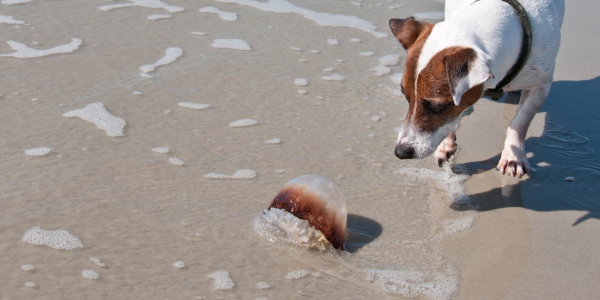Are jellyfish stings dangerous to dogs?
On the Lancashire coastline, it’s not uncommon to see jellyfish washed up on the beach. Jellyfish are a type of boneless sea creature with a bell-like body and long tentacles. The tentacles of jellyfish have nematocysts, which are the cells that cause the stinging sensation.
You may approach them to have a closer look, but you shouldn’t touch them and neither should your dog! If you see any jellyfish you should put your dog on a lead to avoid them touching them.
Although the fur on most dogs offers a layer of protection, they can be just as vulnerable to stings on lightly furred areas such as the face, feet, and abdomen. They are also at risk for stings inside their mouths if they attempt to pick up a jellyfish with their mouths, especially as this stinging action can occur several weeks after the death of the jellyfish.
Washed up jellyfish may be dead, but they still have the ability to sting for several weeks. Dogs often like to investigate everything they come across, but if a jellyfish stings your dog, it’s important to get them seen by a vet as soon as possible if they react.
What should you do if your dog is stung by a jellyfish?
A jellyfish sting can be very painful, especially to your dog. If you think he’s been stung it’s important you remove any stingers and stop the chemical reactions:
- Pull the remaining tentacles off with a stick or towel, but never rub them and be careful that you don’t come into contact with them.
- Never rub the injured area with sand and always clean it with sea water rather than fresh water.
- Contact us straight away.
What are the signs your dog has been stung by a jellyfish?
While it’s unlikely your dog will die from a jellyfish sting, or from licking or swallowing a jellyfish, it can cause an array of symptoms from two minutes to 3 hours after the sting.
There are many types of jellyfish in the ocean, and they have developed several different types of toxins. Common symptoms of a jellyfish sting include:
- Nausea, retching and vomiting
- Excessive drooling
- Swelling
- Licking affected area
- Difficulty breathing
- Quiet and lethargic
- Itching
- Muscle cramps
The recovery time for dogs stung by a jellyfish ranges from two to 48 hours and most dogs usually recover with no side-effects.



